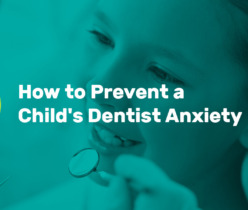Part of the fun of having a newborn is looking forward to each of their milestones — that first gummy smile, rolling over and, of course, your baby’s first teeth. Unfortunately, these brand-new teeth are preceded by the often uncomfortable teething stage. Most parents know when their little one is teething, as their baby expresses the discomfort the only way they know how — crying, fussing and an inability to sleep.
Although the process may not be easy, this milestone shows that your little one is on track developmentally. Teeth are the precursor for a well-rounded diet. Without them, your little one would have to eat puréed food forever. When their teeth erupt, your baby can begin enjoying solid food, which will help them gain weight so that they can continue to grow and develop.
When Can You Expect Your Baby to Start Teething?
The truth is, every baby is different. Generally, you can expect your infant to begin teething between three and six months. Usually, the two bottom teeth pop out first, followed by the four upper front teeth. Before your baby enters this time frame, a few signs and symptoms will indicate that they’re beginning to teethe. Every parent should have a few tips that will make the process easier for both themselves and the baby.
What Are the First Signs of Teething in Babies?
So how will you know if your baby is teething? Not every infant has symptoms of teething. Others have a bit of a miserable experience as the tooth pushes up through the bone and then the gumline. Some of the most common signs and symptoms that your baby is beginning this phase include:
- Crying and irritability
- Drooling
- A low-grade fever under 101 degrees Fahrenheit
- Enlarged and firmer gums
- Increased biting
- Interruptions in sleep
What You Can Do to Help Your Teething Baby
By the time your little one is 24 months old, they should have their complete set of baby teeth. The good news is that teething does not last throughout that entire period. Flair-ups come and go in episodes, and toward the end, your baby will get used to the sensation of erupting teeth.
In the meantime, there are a few things you can do to help minimize your baby’s discomfort:
- Apply a cold compress: Chill — don’t freeze — a wet washcloth or toy, as cold can help naturally numb the gums.
- Give them cold foods or drinks: Applesauce and puréed fruit are great options.
- Rub the gums: Use a clean finger to gently massage your child’s gums.
- Try an over-the-counter pain reliever: Ask your pediatrician about using a pain reliever like acetaminophen or ibuprofen to relieve painful symptoms.
- Consider teethers: Just be careful your baby’s new teeth don’t puncture the plastic.
- Avoid topical teething gels or teething tablets, as these can potentially cause your baby to get sick and only offer temporary relief.
Schedule Your Baby’s First Pediatric Dental Appointment
Although many parents wait until their kids are toddlers, professional dental care should start by the time your child’s first tooth has erupted and no later than their first birthday. If your baby is teething, it’s time to contact Sprout Pediatric Dentistry & Orthodontics.
Our team specializes in treating children from their first baby tooth until they’re teenagers ready to head off to college. Not only can we provide tips to help comfort your child during the teething process, but we can also ensure that they’re on track for proper oral hygiene. Contact us today to request an appointment.

Dr. Dana grew up in Portland and went to Temple University in Philadelphia, PA for dental school. She then moved to Anchorage, AK for her residency in Pediatric Dentistry. Dr. Dana takes a holistic approach to pediatric dentistry & is able to use her own parenting experience to sympathize and understand each family’s unique dynamic.




